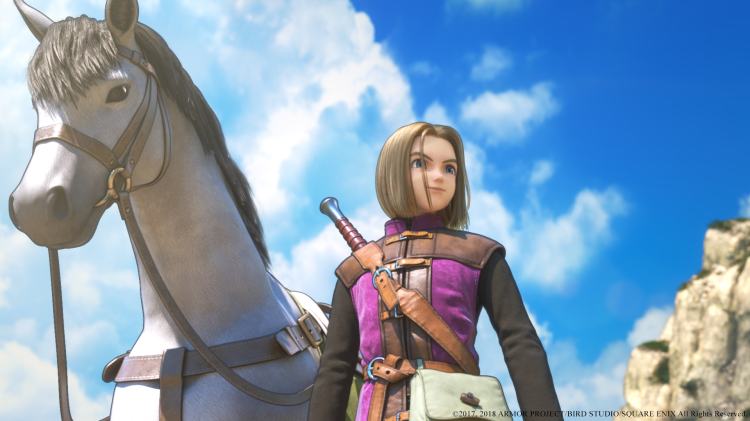Art in the 21st century is weird because the past that informs it is, for the first time in human history, preserved to an exhaustive degree and with pristine clarity. George Lucas made Star Wars to mimic and revel in Golden Age Hollywood serial films because those serials weren’t just in fashion anymore. You couldn’t run down to Blockbuster and rent the 1936 Flash Gordon. Both audience and artist were experiencing the work free of the originals; even if they remember the old stuff, it’s not like they can compare it to the new. But in 2018, anyone who wants to make a new Dragon Quest also has access to the entire history of the series, whether through legal rereleases, remasters, and remakes or through legally gray emulation.
It’s all preserved and present in a manner that compromises attempts to modernize it. The artist can’t tease and toy with the rose-colored haze of memory, and they can’t throw out every convention and start over. They have to walk a tightrope between past and present, new and old. Hence the challenge that Dragon Quest 11 producer Hokuto Okamoto faced. This new PlayStation 4 entry marks not just the Japanese role-playing game series’ 30th anniversary but also the third attempt to make it a globally embraced institution rather than just a Japanese one.
Okamoto is also in a unique position as a producer given the unusual structure of every Dragon Quest development team. Yuji Horii, the original man behind the slimes, remains the director but is somewhat removed from the large pool of creators realizing his vision so Okamoto has a far more creative role than your average producer. But he’s also under unique pressure: Okamoto was born just weeks after Dragon Quest came out. It was the first video game he ever played. The man stewarding the series has, in effect, grown up alongside it.
So how do you make a new Dragon Quest in 2018? Okamoto told us at PAX East with the help of a translator.
June 5th: The AI Audit in NYC
Join us next week in NYC to engage with top executive leaders, delving into strategies for auditing AI models to ensure fairness, optimal performance, and ethical compliance across diverse organizations. Secure your attendance for this exclusive invite-only event.
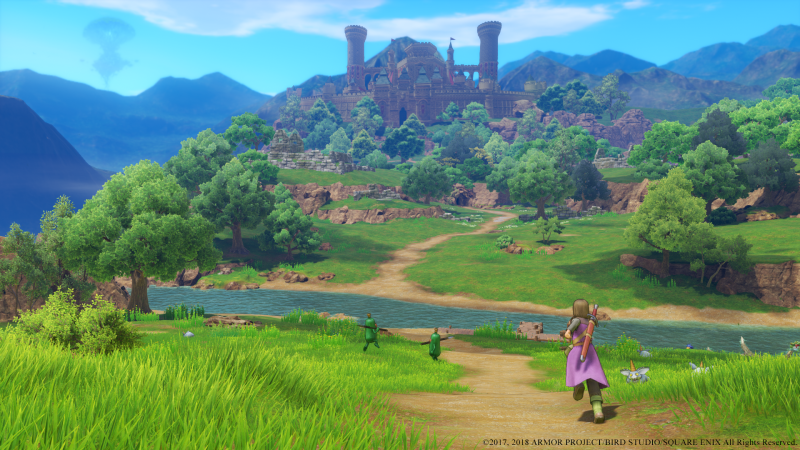
GamesBeat: How did you end up working on Dragon Quest? There’s not a lot of information about your career available in English. From your credits it looks like the first time you worked on anything related to Dragon Quest was Fortune Street on the Wii. How did you come to start working on the series? That board game offshoot is an interesting place to start on something that’s an institution.
Okamoto: I actually joined Square Enix in 2011. The first titles I was involved in were Dragon Quest: Rocket Slime 3 and Fortune Street for the Wii. At the time, the producer on those projects was Noriyoshi Fujimoto, who you may be aware of. I was studying to be a producer under him.
GamesBeat: Why can we still not play Rocket Slime 3 in English?
Okamoto: Oh, do you want that?
GamesBeat: So much.
Okamoto: [Laughs] I see, I see.
GamesBeat: When you got into the game industry, did you say to yourself, “I want to start with one of the most storied game series in history?”
Okamoto: Just to give a bit of background on myself, I was born the same year the original Dragon Quest came out. Dragon Quest was released in May, and I was born in August, so I’m three months younger than Dragon Quest 1. But that was actually the first game I ever played.
I’ve continued to play the series throughout my lifetime. When I first joined the company, I never in my dreams thought that I would take part in the production of Dragon Quest. When I was essentially placed in the department or the team that handles Dragon Quest, my first question was, is it OK that it’s me, that I’m part of this? When I was tasked to work on Dragon Quest titles—it’s a game I’ve played ever since I was very young. I was very happy about that, elated. I was also really pumped up to work hard for the series.
GamesBeat: Dragon Quest one was the very first RPGs I ever played when I was 6 years old, back when it finally came to the United States at the end of the 1980s. It stuck with me in a profound way. Even now, Dragon Quest is, to me, what an RPG should be.
Since you are the series are the same age, how do you define Dragon Quest? Are you beholden to those tenets of 30 years of design? Do you think, “I can’t change Dragon Quest. I can’t let the team change Dragon Quest.”
Okamoto: When we were initially starting the development for Dragon Quest XI—especially considering it would be aligned with the 30th anniversary of the series—we wanted to deliver a completely new experience, but also something that was essentially a culmination of 30 years of Dragon Quest. When we were initially starting development on it, we had a similar discussion with the team. One thing that was interesting in our discussions was that everyone had their own definitive tenets of what a Dragon Quest experience should be like.
It was interesting because everyone’s opinions on that differed across the board. Upon discussing with the team, we arrived at one point that we should never essentially veer off of, and that’s to bring a level of surprise, in a good way, to our players. That’s something we wanted to stay true to.
One thing that Yuji Horii has always mentioned, especially for the first Dragon Quest games—it’s a computer game, in essence, and so often the response and the feedback you get from the game can feel kind of cold. We wanted to bring a level of warmth to the game, which is what you get through speaking with the characters and so on. Even to this day, the systematic text within the game—there’s very few [dialogues] included in Dragon Quest games, if you’ve noticed. That’s something we were also very conscious about when developing Dragon Quest XI. Everything you mentioned about the tenets of Dragon Quest, we feel like you’ll find that in Dragon Quest XI. What do you feel are the most important aspects of a Dragon Quest game?
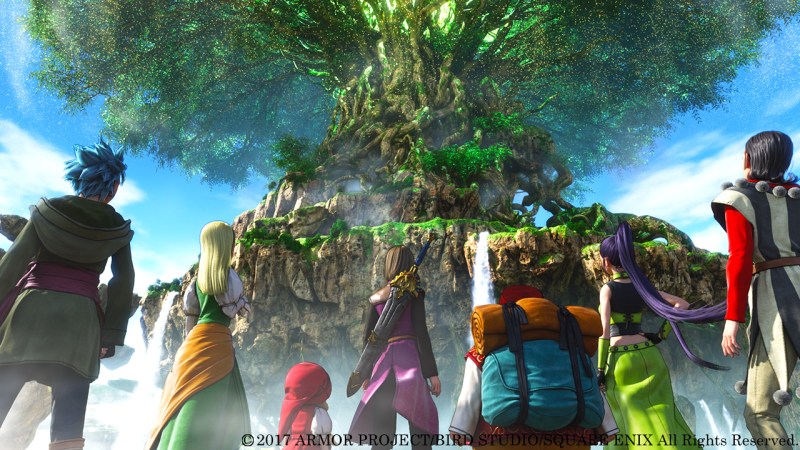
GamesBeat: I always think that Dragon Quest needs to be green. Whenever I play the game, it needs to be verdant and like you’re out in nature. Dragon Quest 1 and all the way to Dragon Quest VIII, I always have that feeling that I’m outdoors in someplace that’s fresh. And I need the enemies to be funny. They need to be really silly every single time. But those are it.
When Dragon Quest IX came out, and people sort of balked at it being so strange and different, I could still see these things. But I could also see why people said, no, that’s too different. Was there anyone on the team who said, “This is what Dragon Quest is!” and you said, “Are you crazy? What are you talking about?”
Okamoto: One interesting aspect—it’s not necessarily incorrect—but there is an instance rate on the dungeons and maps. Often when you go to the deeper end you’ll find a treasure chest or an item. So one person had a thought that that was extremely important and crucial, that basically wherever you ended up you should always find a treasure chest or an item. There would be instances everywhere in the world. So we said, uh, maybe not so much of that? You’re not incorrect. You’re correct to a certain degree. But maybe not to that extent.
GamesBeat: It’s funny you should say that, because years ago, when I was telling someone why they should play Dragon Quest VIII, I said, whenever you go to the end of a landscape, there’s always something there waiting for you. Either a treasure chest or one of the special monsters you could recruit. There’s something to that. There should be a treasure chest every time!
Okamoto: Of course, the development team working on Dragon Quest titles, they also reflect on their memories of the game and what they perceive to be a Dragon Quest experience. Obviously it’s not off. It’s not wrong. But it can be quite extreme.
GamesBeat: I’m interested in the role of a producer for Dragon Quest XI. When you talk to someone in an American game studio, especially an independent studio, a producer’s role isn’t necessarily as creative. It’s someone who’s keeping everyone on task in terms of business. How would you describe your role in the creation of Dragon Quest XI?
Okamoto: We’re fully aware that Dragon Quest might be a unique setup. A lot of it is determined by Yuji Horii, the creator of the series. A lot of the aspects of the game are ultimately up to his discretion. And so the director and producer are on an equal playing field, working under and working with Horii in terms of the creation of the game. Not knowing anything about the game and just handling the business side of things wouldn’t cut it.
We need to fully be aware of the intricacies of the game. If we’re just leaving everything up to the director, often that can get skewed in just one direction. That’s why, as the producers, we have equal say in certain things. If we feel like something might not be going in the right direction, we’ll talk it out with the director and everyone else involved. But in addition to that, I had additional roles, like balancing the levels of the music, or how we would insert some of the music tracks over the cutscenes. Closer to the end of the production, Horii had mentioned that some of the event scenes were a little too long, so he asked me to decide which ones felt a bit too long and adjust them accordingly. I was working on those kinds of random development aspects as well.
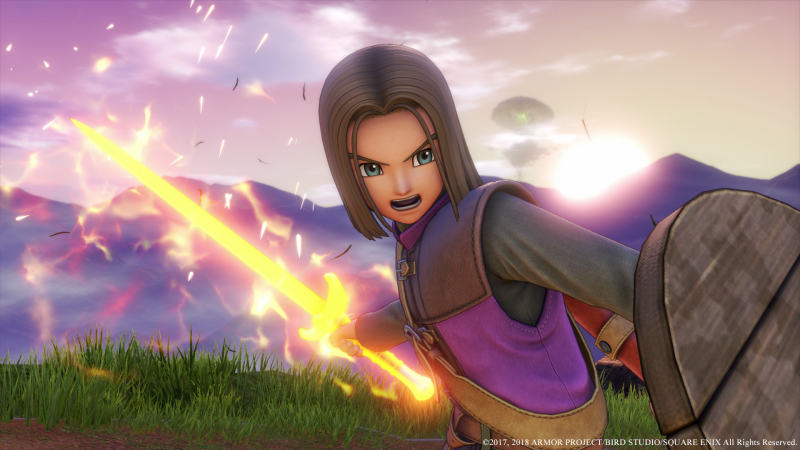
GamesBeat: When you got that order from Horii, how did you go in and determine a cutscene is too long? How do you feel that out? The story scenes in Dragon Quest, all the way back to III, and even up through IX, are pretty short. They’re never that drawn out. I imagine it’s odd to go in and say, we’re so proud of all these story elements, how am I going to make them shorter? Does the game feel like Dragon Quest if they’re too long? How did you figure that out?
Okamoto: One thing to note about Dragon Quest XI is we put a lot of strength into the story that unfolds within the game. We really want everyone to enjoy the story. And so when we were checking the builds, one thing we placed importance on was that all these event sequences would flow into one another quite naturally. What that means is, for example, if there’s an event scene that depicts certain characters walking up to an area and then starting to converse there afterward, you’ve already walked to that location. So maybe it’s about cutting out that one frame, because that would diminish the level of frustration a player might potentially feel.
That kind of smooth transition was important, because we wanted to ensure that people were experiencing the story in the best light. We didn’t want people to get frustrated and stop playing because they were encountering all these additional frames that weren’t necessary. Those were the kinds of detailed adjustments that were done closer to the end of production.
GamesBeat: When the release date was announced for the United States, there was a lot of fervor about the 3DS version not coming to the U.S. and the Switch version not coming out until much later. The press release said Square-Enix is focused on bringing Dragon Quest XI to as many people in the west as possible, and that’s why it’s going to be on PS4 and Steam.
What does success in the west look like for Dragon Quest XI? I see people playing Dragon Quest Builders and Dragon Quest Heroes but that still hasn’t brought the series’ popularity to a critical mass. If Dragon Quest XI is the make or break moment, what does that look like?
Okamoto: The easiest way to gauge it would be if we were to exceed the success that Dragon Quest VIII had overseas. We’ve been over here in the states, talking to a lot of people overseas recently, and a lot of people hold dear to Dragon Quest VIII as being one of their most memorable Dragon Quest experiences. Upon playing Dragon Quest XI, if people raise this up as one of the best in the series, one of the most memorable, we feel like that would also serve as one factor that would help us gauge whether it was a success overseas.
We did earlier mention that Dragon Quest XI also serves as, essentially, a culmination of the series. But we’re also really focused on bringing new players and new fans to the franchise as well. That was one of the pillars in creating this title. So in that sense, we do want everyone to play Dragon Quest XI, and hopefully they’ll really enjoy it. They’ll feel like they’ve missed out on previous titles in the series. If people start to feel that way, we feel like it would also serve as a gauge of our success.
People who have enjoyed the Dragon Quest titles in the past, we’re sure they’ll enjoy this game as well, but even if you haven’t played Dragon Quest, we developed it so that everyone would still find enjoyment in the story that unfolds within the game. We feel confident about bringing this story to new players. We hope that people latch on to it, experience it for themselves, and see how great a Dragon Quest game can be.
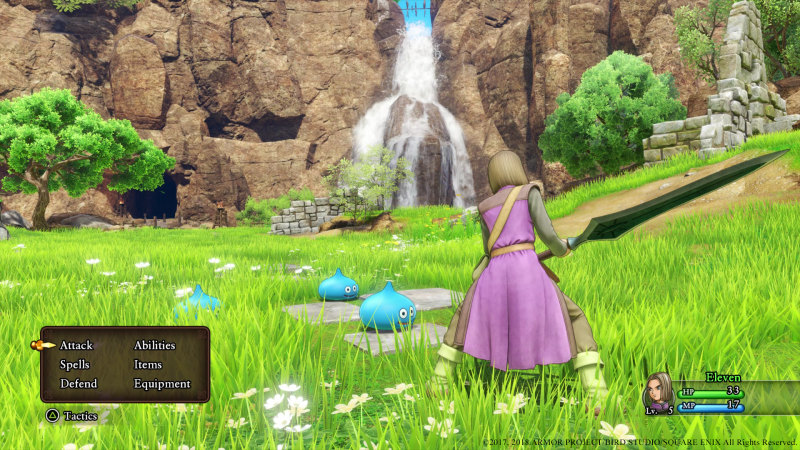
GamesBeat: I’ll be perfectly honest. I’m afraid of Dragon Quest XI, because when Dragon Quest VIII came out, I was in my early 20s, living with friends from college. I lost 100 hours of my life to Dragon Quest VIII.
Okamoto: Rest assured, it’s way more fun than Dragon Quest VIII. [Laughs] It’ll be time well spent.
GamesBeat: There’s a broad conception in the industry that an RPG with turn-based combat isn’t going to be appealing to a bigger audience. That it’s more difficult to bring in new players, people who haven’t played Dragon Quest or RPGs at all if it’s a turn-based combat system. Why do you think that is?
Okamoto: First and foremost, visually, I think before you get to play the game, you’ll see it through various types of footage. When you look at turn-based battle systems, obviously you need to input a command before any action takes place. In terms of flashiness, it doesn’t compare to some other games and genres out there, potentially. At first glance, it may not look as fun. It’s hard to make it look fun. That might be one factor contributing to that.
GamesBeat: These damn kids today.
Okamoto: [Laughs] Also, obviously, turn-based games and command-based games—you really understand the fun of it once you start playing.
